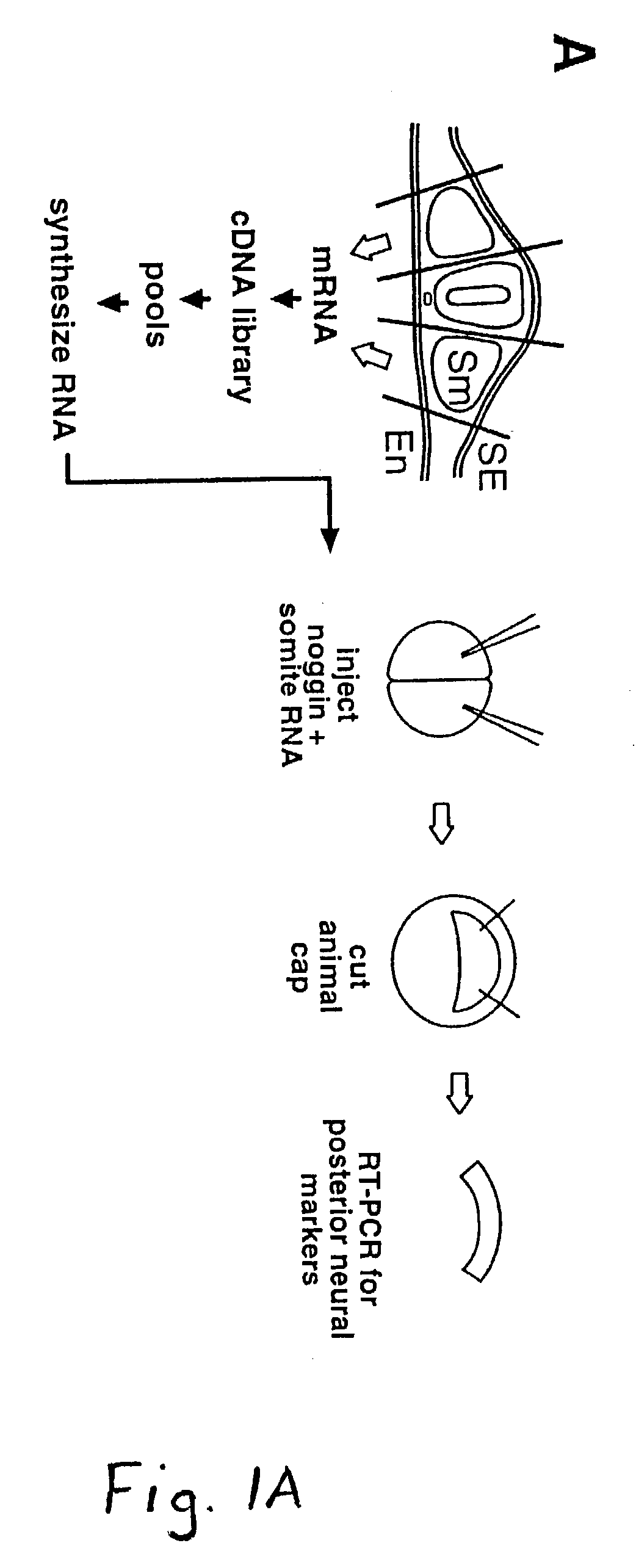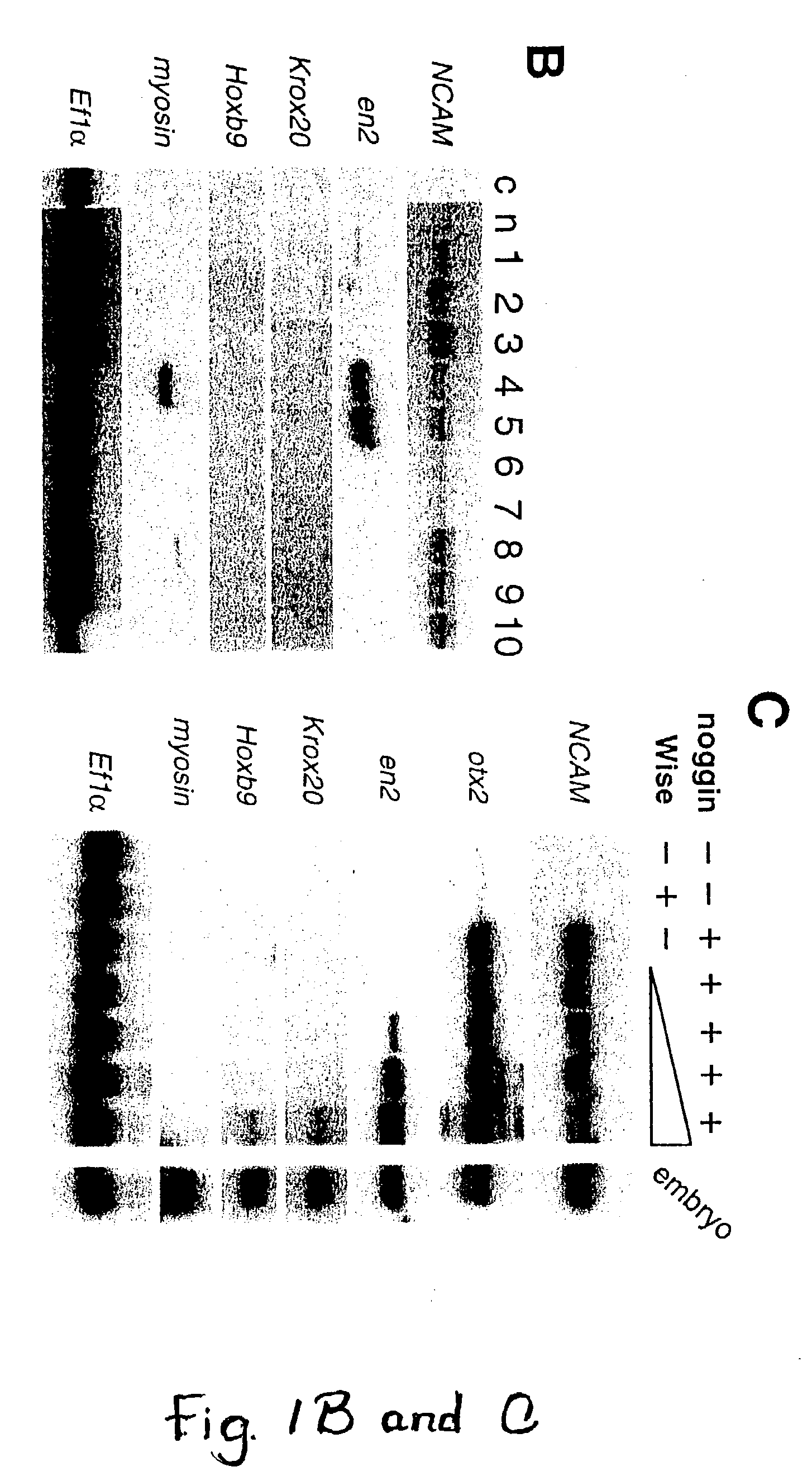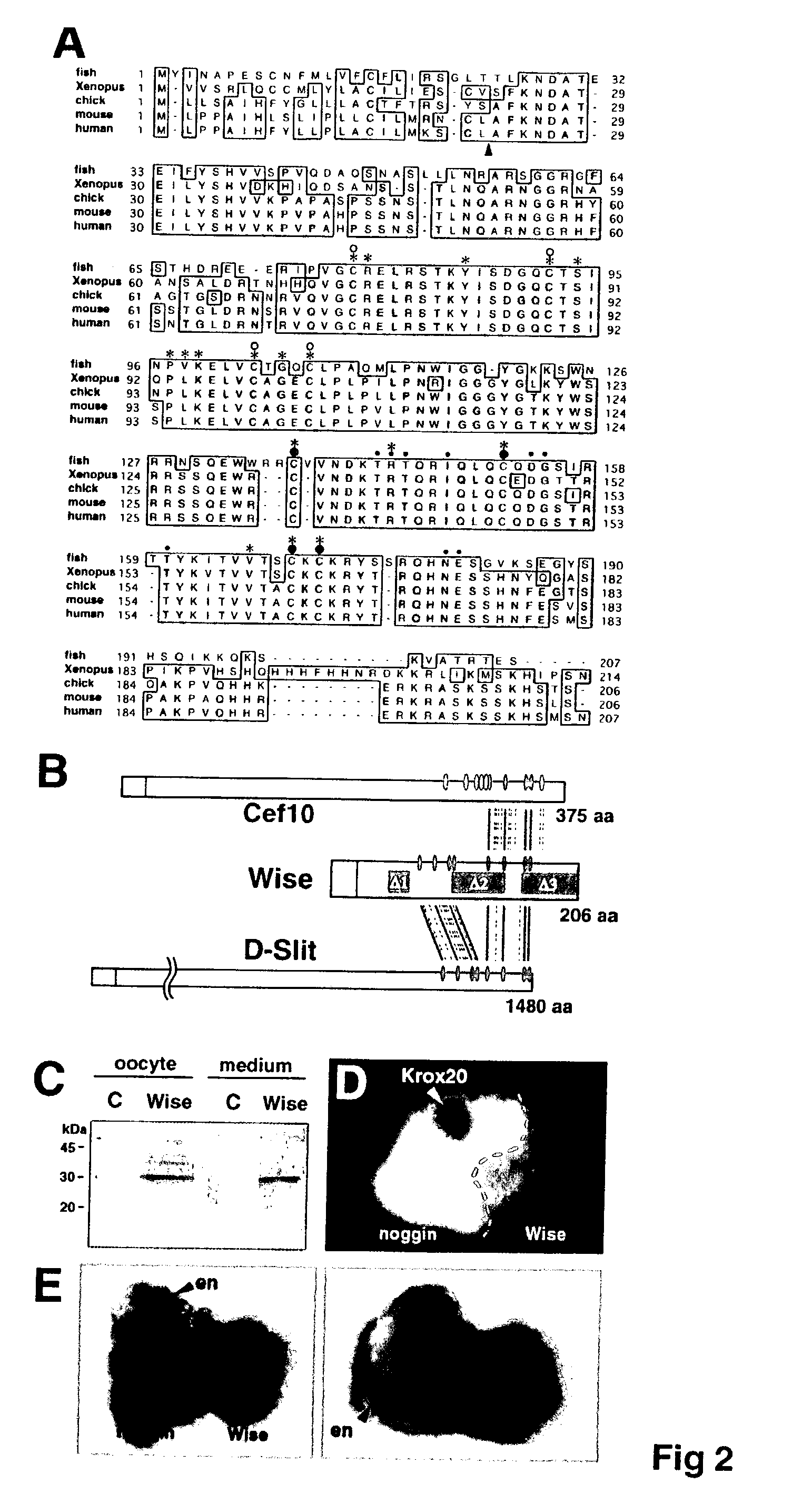Wise/Sost nucleic acid sequences and amino acid sequences
a nucleic acid sequence and amino acid sequence technology, applied in the direction of immunoglobulins, peptides, drugs, etc., can solve the problems of specific developmental defects, complex analysis of posteriorizing signals in neural patterning, and clear complex anterior region patterning, so as to increase bone deposition, increase bone deposition, and increase bone deposition
- Summary
- Abstract
- Description
- Claims
- Application Information
AI Technical Summary
Benefits of technology
Problems solved by technology
Method used
Image
Examples
example 1
[0193] Functional screens in Xenopus were performed with the aim of identifying factors derived from tissues surrounding the neural tube that alter A-P patterning in Noggin-treated animal caps. Two clones were isolated, one encoded a truncated .beta.-catenin and the other a novel secreted protein, which was named Wise. Isolation of the two clones is described below.
[0194] FIG. 1A provides an overview of how factors which impacted patterning were determined. Chick embryo somites, which are capable of transforming pre-otic rhombomeres into a more posterior neural tissue were collected together with overlying ectoderm and underlying endoderm. mRNA was collected from the tissue, which was then used to make a cDNA library. This provided a source of putative posteriorizing factors.
[0195] The cDNA library was made from stage 8-13, (Hamburger and Hamilton, 1951) chick embryos using tissues surrounding the neural tube (FIG. 1A) from axial levels capable of inducing Hoxb9 expression in grafti...
example 2
[0202] To isolate a frog clone, Xenopus stage 25 embryos were collected and a cDNA library was formed. This was used as a template for RT-PCR. Using degenerate primers, designed on the basis of conserved regions between chick and mouse Wise, 500 bp fragments were sub-cloned into pBluescriptIIKS (Stratagene) and sequenced. The degenerate primers used were upstream, SEQ ID NO 129: 5'-GCTTT(T / T)AA(A / G)AA(C / T)GATGCCAC-3'; and downstream, SEQ ID NO 130: 5'-GTGAC(T / C)AC(T / G / A)GT(T / G)ATTTTGTA-3'. Two different clones in the frog were identified (XWise-A and XWise-B) presumably resulting from the pseudotetraploid Xenopus genome. For each clone, 5' and 3' flanking sequences were identified by PCR using a Xenopus stage 35 cDNA library. Standard PCR methods are described in U.S. Pat. No. 4,683,195; U.S. Pat. No. 4,683,202; Saiki et al., Science 230:1350-1354 (1985); Innis et al., PCR Protocols: A Guide to Methods and Applications, Academic Press, Inc., San Diego, Calif. (1990).
[0203] The predi...
example 3
[0206] A signal sequence motif is present at the N-terminus of Wise, and its secretion was confirmed by Western blotting following expression of an HA-tagged version of the protein in Xenopus oocytes (FIG. 2C) and COS cells. More particularly, Wise was injected in an amount equal to 30 ng / embryo. Western blot analysis detected HA-tagged Wise protein secreted into the medium following RNA injection into oocytes. FIG. 2C, related to the control of uninjected oocytes. Secretion of Wise was confirmed by expression of an HA-tagged version of the protein in Xenopus oocytes and COS cells. The protein was detected in both cell extracts and the culture medium (FIG. 2C). It was observed that Wise encoded a signal sequence motif at its N-terminus, suggesting that the protein is secreted.
[0207] Further, the ability of Wise to posteriorize neural tissue in a cell non-autonomous manner was tested by using a tissue recombination assay in which a Wise-expressing animal cap was combined with a noggi...
PUM
| Property | Measurement | Unit |
|---|---|---|
| Fraction | aaaaa | aaaaa |
| Molar density | aaaaa | aaaaa |
| Molar density | aaaaa | aaaaa |
Abstract
Description
Claims
Application Information
 Login to View More
Login to View More - R&D
- Intellectual Property
- Life Sciences
- Materials
- Tech Scout
- Unparalleled Data Quality
- Higher Quality Content
- 60% Fewer Hallucinations
Browse by: Latest US Patents, China's latest patents, Technical Efficacy Thesaurus, Application Domain, Technology Topic, Popular Technical Reports.
© 2025 PatSnap. All rights reserved.Legal|Privacy policy|Modern Slavery Act Transparency Statement|Sitemap|About US| Contact US: help@patsnap.com



